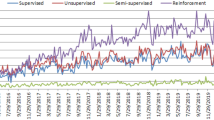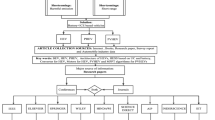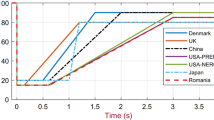Abstract
A power management framework for hybrid electric vehicles (HEVs) is proposed based on deep reinforcement learning (DRL) with a Long Short-Term Memory (LSTM) network to minimize the fuel consumption through determining the power distribution between the two propulsion sources, the internal combustion engine (ICE) and the electric motor (EM). DRL is effective for handling the high-dimensional state and action spaces in the HEV power management problem, and the LSTM structure leverages temporal dependencies of input information, providing internal state predictions automatically without introducing extra state variables. This technique is entirely online, meaning that the framework is constructed in real time during the training phase, independently of a prior knowledge of driving cycles. The learned information stored in the LSTM network is utilized efficiently, and the computational speed is enhanced by making multiple predictions simultaneously in each step. Simulation over various driving cycles demonstrates the efficacy of the proposed framework in fuel economy improvement.







Similar content being viewed by others
Availability of data and material
Not applicable.
References
(2003) Advisor documentation. National Renewable Energy Laboratory. http://adv-vehicle-sim.sourceforge.net/advisor_doc.html. Accessed 28 Feb 2018
Baumann BM, Washington G, Glenn BC, Rizzoni G (2000) Mechatronic design and control of hybrid electric vehicles. IEEE/ASME Trans Mechatron 5(1):58–72
Chen Z, Mi CC, Xu J, Gong X, You C (2014) Energy management for a power-split plug-in hybrid electric vehicle based on dynamic programming and neural networks. IEEE Trans Veh Technol 63(4):1567–1580
Gong Q, Li Y, Peng Z (2009) Power management of plug-in hybrid electric vehicles using neural network based trip modeling. In: American control conference, 2009. ACC’09. IEEE, pp 4601–4606
Hausknecht M, Stone P (2015) Deep recurrent q-learning for partially observable mdps. CoRR, abs/150706527
He X, Parten M, Maxwell T (2005) Energy management strategies for a hybrid electric vehicle. In: 2005 IEEE conference vehicle power and propulsion. IEEE, pp 390–394
Jeon S, Jo S, Park Y, Lee J (2002) Multi-mode driving control of a parallel hybrid electric vehicle using driving pattern recognition. J Dyn Syst Meas Control 124(1):141–149
Kermani S, Delprat S, Guerra T, Trigui R (2009) Predictive control for hev energy management: experimental results. In: Vehicle power and propulsion conference, (2009) VPPC’09, IEEE. IEEE, pp 364–369
Kirschbaum F, Back M, Hart M (2002) Determination of the fuel-optimal trajectory for a vehicle along a known route. IFAC Proc Vol 35(1):235–239
Lample G, Chaplot DS (2017) Playing fps games with deep reinforcement learning. In: AAAI, pp 2140–2146
Lin CC, Peng H, Grizzle JW, Kang JM (2003) Power management strategy for a parallel hybrid electric truck. IEEE Trans Control Syst Technol 11(6):839–849
Lin CC, Peng H, Grizzle J (2004) A stochastic control strategy for hybrid electric vehicles. In: American control conference, 2004. Proceedings of the 2004. IEEE, vol 5, pp 4710–4715
Lin X, Wang Y, Bogdan P, Chang N, Pedram M (2014) Reinforcement learning based power management for hybrid electric vehicles. In: Proceedings of the 2014 IEEE/ACM international conference on computer-aided design. IEEE Press, pp 32–38
Liu C, Murphey YL (2014) (2014) Power management for plug-in hybrid electric vehicles using reinforcement learning with trip information. In: Transportation electrification conference and expo (ITEC), IEEE. IEEE, pp 1–6
Liu T, Hu X, Li SE, Cao D (2017) Reinforcement learning optimized look-ahead energy management of a parallel hybrid electric vehicle. IEEE/ASME Trans Mechatron 22(4):1497–1507
Mnih V, Kavukcuoglu K, Silver D, Rusu AA, Veness J, Bellemare MG, Graves A, Riedmiller M, Fidjeland AK, Ostrovski G et al (2015) Human-level control through deep reinforcement learning. Nature 518(7540):529
Moreno J, Ortúzar ME, Dixon JW (2006) Energy-management system for a hybrid electric vehicle, using ultracapacitors and neural networks. IEEE Trans Ind Electron 53(2):614–623
Musardo C, Rizzoni G, Guezennec Y, Staccia B (2005) A-ecms: an adaptive algorithm for hybrid electric vehicle energy management. Eur J Control 11(4–5):509–524
Ng KS, Moo CS, Chen YP, Hsieh YC (2009) Enhanced coulomb counting method for estimating state-of-charge and state-of-health of lithium-ion batteries. Appl Energy 86(9):1506–1511
Onori SRG, Serrao L (2016) HEV modeling. Springer, London
Paganelli G, Tateno M, Brahma A, Rizzoni G, Guezennec Y (2001) Control development for a hybrid-electric sport-utility vehicle: strategy, implementation and field test results. In: american control conference, 2001. Proceedings of the 2001, IEEE, vol 6, pp 5064–5069
Paganelli G, Delprat S, Guerra TM, Rimaux J, Santin JJ (2002) Equivalent consumption minimization strategy for parallel hybrid powertrains. In: Vehicular technology conference, 2002. VTC Spring 2002. IEEE 55th, IEEE, vol 4, pp 2076–2081
Pu J, Yin C (2007) Optimal control of fuel economy in parallel hybrid electric vehicles. Proc Inst Mech Eng Part D J Automob Eng 221(9):1097–1106
Qi X, Wu G, Boriboonsomsin K, Barth MJ, Gonder J (2016) Data-driven reinforcement learning-based real-time energy management system for plug-in hybrid electric vehicles. Transp Res Rec J Transp Res Board 2572:1–8
Salman M, Schouten NJ, Kheir NA (2000) Control strategies for parallel hybrid vehicles. In: American control conference, 2000. Proceedings of the 2000. IEEE, vol 1, pp 524–528
Schouten NJ, Salman MA, Kheir NA (2002) Fuzzy logic control for parallel hybrid vehicles. IEEE Trans Control Syst Technol 10(3):460–468
Sciarretta A, Back M, Guzzella L (2004) Optimal control of parallel hybrid electric vehicles. IEEE Trans Control Syst Technol 12(3):352–363
Sundström O, Guzzella L, Soltic P (2008) Optimal hybridization in two parallel hybrid electric vehicles using dynamic programming. IFAC Proc Vol 41(2):4642–4647
Sutton RS, Barto AG (1998) Reinforcement learning: an introduction. MIT Press, Cambridge
Tian X, Cai Y, Sun X, Zhu Z, Xu Y (2019a) An adaptive ecms with driving style recognition for energy optimization of parallel hybrid electric buses. Energy 189(116):151
Tian X, He R, Sun X, Cai Y, Xu Y (2019b) An anfis-based ecms for energy optimization of parallel hybrid electric bus. IEEE Trans Veh Technol 69(2):1473–1483
Tie SF, Tan CW (2013) A review of energy sources and energy management system in electric vehicles. Renew Sustain Energy Rev 20:82–102
Xiong R, Cao J, Yu Q (2018) Reinforcement learning-based real-time power management for hybrid energy storage system in the plug-in hybrid electric vehicle. Appl Energy 211:538–548
Yan F, Wang J, Huang K (2012) Hybrid electric vehicle model predictive control torque-split strategy incorporating engine transient characteristics. IEEE Trans Veh Technol 61(6):2458–2467
Yue S, Wang Y, Xie Q, Zhu D, Pedram M, Chang N (2014) Model-free learning-based online management of hybrid electrical energy storage systems in electric vehicles. In: Industrial electronics society, IECON 2014-40th annual conference of the IEEE. IEEE, pp 3142–3148
Zhao P, Wang Y, Chang N, Zhu Q, Lin X (2018) A deep reinforcement learning framework for optimizing fuel economy of hybrid electric vehicles. In: Design automation conference (ASP-DAC), 2018 23rd Asia and South Pacific, IEEE
Funding
The authors did not receive support from any organization for the submitted work.
Author information
Authors and Affiliations
Corresponding author
Ethics declarations
Conflict of interest
The authors have no relevant financial or non-financial interests to disclose.
Code availability
Not applicable
Additional information
Publisher's Note
Springer Nature remains neutral with regard to jurisdictional claims in published maps and institutional affiliations.
A preliminary version of this paper was presented at the 23rd Asia and South Pacific Design Automation Conference (ASP-DAC 2018), Jeju Island, Korea [36]
Rights and permissions
About this article
Cite this article
Sun, M., Zhao, P. & Lin, X. Power management in hybrid electric vehicles using deep recurrent reinforcement learning. Electr Eng 104, 1459–1471 (2022). https://doi.org/10.1007/s00202-021-01401-7
Received:
Accepted:
Published:
Issue Date:
DOI: https://doi.org/10.1007/s00202-021-01401-7




